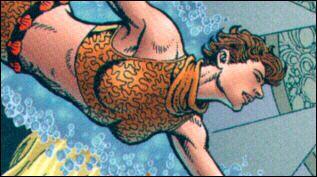

Going Gently
Good King Juvor always said that if an old man such as himself should take a ward, there could be no better choice than Tula. As a baby, she slept through the night and would open her mouth eagerly to any algae mixture. She showed no special preference for any of her toys and took the succession of nurses very sensibly, crying when they left, but smiling at the new face in the morning. She was a sweet child, a child that didn't question what was taken away as long as something else was brought in to replace it.
Tula's parents perished in the O'uha disaster. A Chinese oil tanker aimed for Kalaeloa Barbers Point Harbor and missed, ran aground instead and sprang a leak. All Atlanteans within ten sea miles were killed instantly, Tula's parents among them. But King Juvor took her in and she doesn't talk about her parents, never has and the locket around her neck is empty. And though she is solicitous in guarding the health and well-being of the king who is getting on in years, she doesn't fuss. King Juvor wouldn't allow it. Even a sea-life must come to an end, he says, and his has been long and mostly good.
He has told Tula that many times and he tells her now. Tula smiles and places another blanket on his lap. Yes, Uncle, she says, it's been a good life and it's not over yet. But you were telling me about the first submarines, the Korean Hedgehogs; did the landsmen really breathe through reeds?
She attends King Juvor after he has met with his councilors in the morning and spent most of his strength with them. She brings lunch and afternoon tea to his rooms and sits with him, while he rests or drowses in his chair. Occasionally, he asks her to read aloud or talk to him, though he tends to drop off when she does. There is little that can hold his attention now and even less to keep him with them. With her.
The room is brightly lit and it's getting harder for Tula to ignore how gaunt he has become. Or how his mouth falls open when he sleeps, like an old, old man. But he is old. Of course he is. He represented Atlantis at the inauguration of the Suez Canal in 1869 and is one of the few to remember the Napolean wars. Those were the days, he used to say, a rare twinkle in his eye, and Tula would catch a glimpse of another man in him, one who didn't at all resemble her prudent, cautious uncle.
He kept her sheltered and close, always. She was ten before he would let her swim the Panama Canal and when he finally did, he crossed it with her to be sure she made it safely through. Only a few years ago, but it seems like an eternity. Now her kick is stronger than his and she has to guide him up and down the stairs, since he will not submit to the indignity of waiting for an elevator.
On good days, when King Juvor is still the uncle of Tula's childhood, he insists that Tula needs to get out more, get some fresh water, see her friends. But he seems content in her presence, so she stays anyway, if only to watch him sleep. His breathing hitches in his chest sometimes, then resumes. Straightening the blankets is an excuse to touch, to let her hand brush over papery skin and be reassured at its warmth; she does it more often than is strictly necessary.
The doctors say heart failure and anytime now. Tula wonders if she should
let go, but she doesn't quite know how to. She wonders if she should try
to care for him more and love him less in days to come -- or if it's better
the other way around.
FIN 
Origin of reference images unknown.